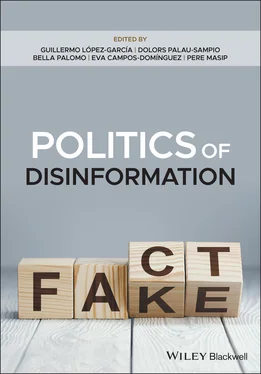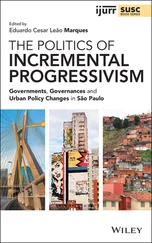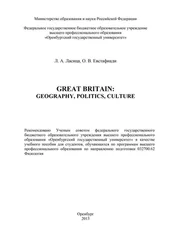Politics of Disinformation
Здесь есть возможность читать онлайн «Politics of Disinformation» — ознакомительный отрывок электронной книги совершенно бесплатно, а после прочтения отрывка купить полную версию. В некоторых случаях можно слушать аудио, скачать через торрент в формате fb2 и присутствует краткое содержание. Жанр: unrecognised, на английском языке. Описание произведения, (предисловие) а так же отзывы посетителей доступны на портале библиотеки ЛибКат.
- Название:Politics of Disinformation
- Автор:
- Жанр:
- Год:неизвестен
- ISBN:нет данных
- Рейтинг книги:5 / 5. Голосов: 1
-
Избранное:Добавить в избранное
- Отзывы:
-
Ваша оценка:
- 100
- 1
- 2
- 3
- 4
- 5
Politics of Disinformation: краткое содержание, описание и аннотация
Предлагаем к чтению аннотацию, описание, краткое содержание или предисловие (зависит от того, что написал сам автор книги «Politics of Disinformation»). Если вы не нашли необходимую информацию о книге — напишите в комментариях, мы постараемся отыскать её.
Discover a comprehensive exploration of the underlying theories of disinformation, and their impact, from leading voices in the field Politics of Disinformation
Politics of Disinformation
Politics of Disinformation — читать онлайн ознакомительный отрывок
Ниже представлен текст книги, разбитый по страницам. Система сохранения места последней прочитанной страницы, позволяет с удобством читать онлайн бесплатно книгу «Politics of Disinformation», без необходимости каждый раз заново искать на чём Вы остановились. Поставьте закладку, и сможете в любой момент перейти на страницу, на которой закончили чтение.
Интервал:
Закладка:
Table 1.3 Most-cited articles (total accumulated citations)
| Article | Authors | Journal | Year | Total citations | Average citations per year |
|---|---|---|---|---|---|
| The Daily Show: Discursive integration and the reinvention of political journalism | Baym, Geoffrey | Political Communication | 2005 | 229 | 14.3 |
| Defining fake news: A typology of scholarly definition | Tandoc Jr., Edson C.; Lim, Zheng Wei; Ling, Richard | Digital Journalism | 2018 | 219 | 73 |
| The age of Twitter: Donald J. Trump and the politics of debasement | Ott, Brian L. | Critical Studies in Media Communication | 2017 | 128 | 32 |
| Populism and social media: How politicians spread a fragmented ideology | Engesser, Sven; Ernst, Nicole; Esser, Frank; Buechel, Florin | Information Communication & Society | 2017 | 125 | 31.3 |
| In related news, that was wrong: The correction of misinformation through related stories functionality in social media | Bode, Leticia; Vraga, Emily K. | Journal of Communication | 2015 | 92 | 15.3 |
With respect to the analysis of co-citation, implemented with the VOS viewer application, five research clusters can be observed, connected by Edson Tandoc as the central node (Figure 1.2 ).

Figure 1.2 Research clusters concerning disinformation.
Bibliographic Analysis
Politics, the Realm of Disinformation
An initial content analysis of the articles examined shows that they address a broad variety of themes ( Table 1.4), although four areas account for 93% of the articles: Political Communication (37.56%), Mass Communication (36.18%), Journalism Studies (12.44%), and Health Communication (6.91%).
Table 1.4 Distribution of articles by theme
| General categories | Matches | % |
|---|---|---|
| Political Communication | 163 | 37.6 |
| Mass Communication | 157 | 36.2 |
| Journalism Studies | 54 | 12.4 |
| Health Communication | 30 | 6.9 |
| Ethnicity and Race in Communication | 9 | 2.1 |
| Interpersonal Communication | 6 | 1.4 |
| Philosophy, Theory, and Critique | 5 | 1.2 |
| Environmental Communication | 4 | 0.9 |
| Feminist Scholarship | 2 | 0.5 |
| Children, Adolescents, and Media | 1 | 0.2 |
| Information Systems | 1 | 0.2 |
| Organizational Communication | 1 | 0.2 |
| Public Relations | 1 | 0.2 |
The search for the causes and consequences of disinformation in the political sphere has been undertaken in numerous countries, but the majority of studies focus on the United States. Rojecki and Meraz (2016) are the authors of one of the pioneering studies on misinformation, in which they analyze facts, half-truths, and untruths during the presidential election of 2004; they conclude that by itself the web is not sufficient for spreading misinformation, but it can influence or set the agenda for traditional media. For the 2008 election, in which Obama confronted McCain, Weeks and Garrett carried out a national telephone survey to examine the consequences of inaccurate political rumors and found that believing rumors about an opposed candidate reinforced a vote for the preferred candidate (Weeks and Garrett 2014). In the 2012 election there was a tendency to analyze activity on Twitter, where Republicans evinced stronger outgroup negativity and hostility toward fact-checkers than Democrats (Shin and Thorson 2017). However, the scientific production that accompanied the 2016 presidential election was more fertile, because the disinformation order generated an unprecedented democratic disruption (Bennett and Livingston 2018). These strategies have made Trump a referent in studies on disinformation; he is mentioned in 200 articles, 45.9% of the sample.
The case of Brazil has also attracted academic interest, especially due to the rise of right-wing extremist Jair Bolsanaro to the presidency and the resentment toward the Partido dos Trabalhadores, which were achieved by publishing messages in Facebook and WhatsApp groups (Canavilhas et al. 2019; Davis and Straubhaar 2020; Rossini et al. 2020). This alienation was also reproduced in Germany, where Zimmermann and Kohring (2020) showed the direct relation existing between media, politics, and disinformation, confirming that the less one trusts in news media and politics, the more one believes in online disinformation. The emergence 6of these extremist movements online has given rise to permanent vigilance among the population in places like India as well (Das and Schroeder 2020), but simultaneously many citizens are complicit with disinformation techniques, as could be seen in the 2017 UK general election campaign (Chadwick et al. 2018).
Apart from electoral periods, authoritarian countries (Stoycheff et al. 2016; Wang et al. 2020), referendums (Furman and Tunç 2019), and territorial conflicts such as those between Russia and Ukraine (Mejias and Vokuev 2017) or the independence of Catalonia (Del-Fresno-García and Manfredi-Sánchez 2018) have also given rise to waves of disinformation and relevant studies. Special mention is merited by comparative cross-national approaches, which have identified tendencies derived from exposure to disinformation in Africa as well (Wasserman and Madrid-Morales 2019), although the most extensive investigation was carried out by Humprecht et al. (2020), who empirically examined 18 Western democracies, which they catalogue according to their high or low resilience to online disinformation.
Besides the predominant themes, the articles in the sample present a wide variety in their choice of media for study, which is a reflection of the indiscriminate expansion of disinformation ( Table 1.5). The majority of studies use multi-media approaches (60.1%), in which they combine analysis of social media, online newspapers, legacy media, and/or content from radio or television. In second place there are the investigations focusing exclusively on social media (26.5%). Within this group, one in three works focuses on the disinformation found on Twitter. This quantity of production is due to two basic reasons: first, Twitter’s application programming interface (API) makes it possible to download and analyze conversations that involve an extensive number of tweets, and second, it is the social media that journalists prefer (Coddington et al. 2014). Studies focusing on YouTube, WhatsApp, Telegram, or WeChat are exceptional and only account for 5% of total production.
Table 1.5 Media subjected to analysis
| Categories | Matches | % |
|---|---|---|
| Multimedia | 261 | 60.1 |
| Social networks | 115 | 26.5 |
| Fact-checking platforms | 19 | 4.4 |
| Newspapers | 14 | 3.2 |
| Online newspapers | 6 | 1.4 |
| Television | 6 | 1.4 |
| Internet | 4 | 0.9 |
| RSS | 3 | 0.7 |
| Tech companies | 2 | 0.5 |
| Group forums | 2 | 0.5 |
| Magazines | 1 | 0.2 |
| Radio | 1 | 0.2 |
Methodological Trends
Интервал:
Закладка:
Похожие книги на «Politics of Disinformation»
Представляем Вашему вниманию похожие книги на «Politics of Disinformation» списком для выбора. Мы отобрали схожую по названию и смыслу литературу в надежде предоставить читателям больше вариантов отыскать новые, интересные, ещё непрочитанные произведения.
Обсуждение, отзывы о книге «Politics of Disinformation» и просто собственные мнения читателей. Оставьте ваши комментарии, напишите, что Вы думаете о произведении, его смысле или главных героях. Укажите что конкретно понравилось, а что нет, и почему Вы так считаете.












